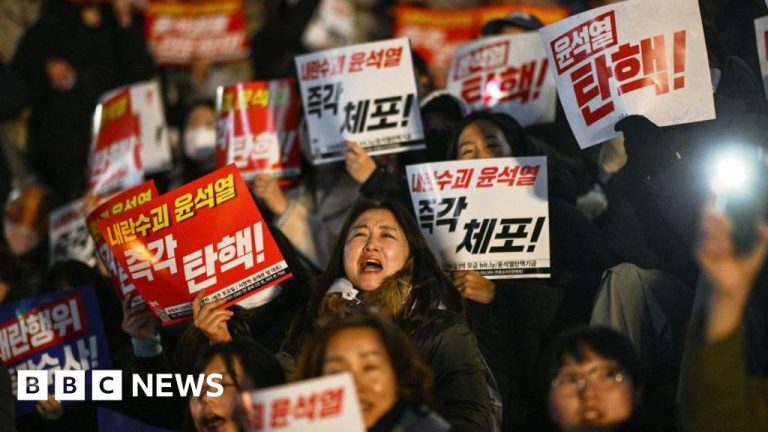South Korean President Yoon Suk Yeol faces growing pressure to resign over his failed attempt to impose martial law, as Parliament moves closer to a vote on his impeachment.
The capital Seoul saw a second day of street protests demanding Yoon's resignation while police said he was being investigated for “insurrection.”
The opposition is pushing for the motion to impeach Yoon to be voted on Saturday, even though the president's party has said it is against it.
At least eight members of Yoon's party need to vote in favor of his impeachment for the motion to pass with a two-thirds majority in the 300-seat parliament.
South Korea was plunged into political turmoil on Tuesday evening when Yoon declared martial law.
He cited threats from “anti-state forces” and North Korea. However, it soon became clear that his decision had not been motivated by external threats but by his own domestic political problems.
Yoon rescinded the statement six hours later after lawmakers rejected it. Some lawmakers jumped over barricades and fences to bypass security forces to meet in Parliament and overturn Yoon's decree.
His attempt to rule by martial law sparked public outrage and street protests. He has not spoken publicly since revoking his decision Wednesday morning.
Before his attempt to place the country under military rule, Yoon faced low popularity, corruption allegations and an opposition-led legislature that reduced him to a lame-duck leader.
More anti-Yoon rallies are expected to take place in Seoul later Thursday. They are expected to expand as people join them after work or school. There were also some rallies in support of him, but they were much more modest.
Some lawmakers are also staying close to the National Assembly to ensure they are ready to overturn another martial law decree, should Yoon attempt to do so again.
Authorities opened an investigation into Yoon for alleged insurrection following a complaint by the opposition, said Woo Jong-soo, head of the National Police National Investigation Headquarters. Insurrection is punishable by death and transcends presidential immunity.
The National Assembly also opened an investigation into the declaration of martial law on Thursday.
“The declaration of emergency martial law by the Yoon Suk Yeol regime has caused great confusion and fear among our people,” said opposition Democratic Party lawmaker Kim Seung-won.
Yoon's Defense Minister Kim Yong-hyun resigned on Thursday and took full responsibility for declaring martial law.
It was Kim who suggested martial law to Yoon, Interior Minister Lee Sang-min told the parliamentary hearing. South Korean media published similar reports.
It became clear during the hearing that few people knew about Yoon's plan. Vice Defense Minister Kim Seon-ho said he heard about it on the news.
Army Chief Park An-su said he only received the text of the martial law notice Tuesday evening.
“There were four of us looking at the project… Even though we are military experts, we are not martial law experts. Time was passing and we were all wondering 'what should we do, what should we TO DO ?' he told deputies.
A motion to impeach Yoon was tabled in Parliament on Wednesday evening, and South Korean law requires it to be put to a vote within 72 hours.
The main opposition Democratic Party is pushing for a vote Saturday evening.
If the impeachment is approved, the president will be immediately suspended from office, while the prime minister will become acting president.
A trial will then take place before the Constitutional Court, a nine-member council that oversees branches of South Korea's government. The process could take up to 180 days.
If six of the court members vote in favor of impeachment, the president will be removed from office.

